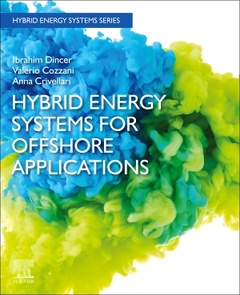Description
Hybrid Energy Systems for Offshore Applications
Hybrid Energy Systems Series
Authors: Dincer Ibrahim, Cozzani Valerio, Crivellari Anna
Language: English
Subject for Hybrid Energy Systems for Offshore Applications:
Keywords
?Accident consequence modeling; Adriatic sea; Aggregation approach; Aggregation metrics; Atlantic Ocean; Chemical energy carrier; Cost analysis; Criticality screening; Decision-making; Decommissioning; Depleted reservoir; Early design choices; Economic sustainability; Electrical consumption; Energy; Environmental impact assessment; Environmental sustainability; Exergoeconomic assessment; Exergy; GHG emissions; Gas turbine; Gas-to-power; Hydrogen; Hydrogen production; Inherent safety; Inherent safety analysis; Inherently safe design; Inherently safer design; Integrated sustainability assessment; Key performance indicators; Methanol; Methanol production; Methodology validation; Monte Carlo simulation; Multi-criteria decision analysis; Multi-criteria indicators; Multi-criteria methodologies; Multi-target hazard; Natural gas valorization; North sea; Offshore hybrid energy system; Offshore oil and gas; Offshore renewable; Offshore wind; Offshore wind energy; Oil and gas decommissioning; Oil and gas installations; Power dispatchment; Power-to-gas; Power-to-liquid; Prioritization; Renewable energy converter; SWOT; Societal sustainability; Solar energy; Supporting tools; Sustainable energy systems; Synthetic natural gas; Systematic framework; Technological sustainability; Thermodynamic analysis; Tidal currents energy; Wave energy; Weight elicitation
165.11 €
In Print (Delivery period: 14 days).
Add to cart328 p. · 19x23.4 cm · Paperback
Description
/li>Contents
/li>Biography
/li>Comment
/li>
There has been a strong need to enhance the utilization of renewable energy systems (RESs) from onshore to offshore applications where oil and gas companies are pivoting to integrate such renewable energy options into their offshore operations to lower their carbon footprint, extend the lifetime of their assets, and expand their market. In this regard, innovative hybrid energy systems, such as ?Power to Gas (P2G) and ?Power to Liquid (P2L) options, as well as novel integration strategies for ?Gas to Power (G2P) systems, offer the opportunity to implement solutions energy transition, paving the way to offshore RES deployment.
Hybrid Energy Systems for Offshore Applications delivers a comprehensive presentation of state of the art and perspective developments of offshore RES exploitation strategies and technologies, and provides a unique portfolio of decision-making methodologies supporting the selection of the most suitable options for offshore renewable energy production at a specific site. System modeling and analysis along with the definitions of multicriteria methodologies and strategies based on sustainability, environmental impact, and safety performance indicators are addressed in an integrated fashion. Rounding out with both research and practical applications explained, this book gives academicians and industrial professionals fundamentals and methods for integrated performance analysis of innovative systems addressing offshore RES exploitation, sustainable chemical and power production, better efficiency, lower costs, lower environmental impact, and higher inherent safety.
1. Introduction 2. Offshore Renewable Energy Options 3. Innovative Hybrid Energy Options 4. System Modelling and Analysis 5. Sustainability Index Development 6. Case studies 7. Conclusions and Future Directions
Valerio Cozzani (1968) received his Ph.D. in Chemical Engineering from the University of Pisa (Italy) in 1996. During the Ph.D. he spent an year at the Industrial Hazard Unit (IPSC) of the Ispra European Community Joint Research Centre. After the Ph.D. he joined the National Research Group on Chemical and Environmental Risk of the Italian National Council of Research. Formerly lecturer at the University of Pisa, he is now professor at the Department of Civil, Chemical, Environmental and Materials Engineering of Bologna University, where he leads the Laboratory on Industrial Safety and Environmental Sustainability. He is Director of the academic graduate and undergraduate programs in Chemical Engineering an lectures on unit operations, design, loss prevention and risk assessment. He coordinated several joint university-industry training projects. His main research experience is in the field of safety of chemical processes and of environmental and energy technologies. The specific subjects afforded in his research a
- Harmonized presentation of RESs
- Unique coverage on hybrid energy systems and their offshore applications
- Comprehensive thermodynamic analysis and evaluation of the developed systems
- Process and system modeling, analysis, and decision-making methodologies for offshore P2G, P2L, and G2P solutions
- Sustainability modeling and assessment studies for various offshore applications
- Distinct parametric studies, illustrations, and case studies
- Specific sustainability and safety performance indicators for comparative evaluations




